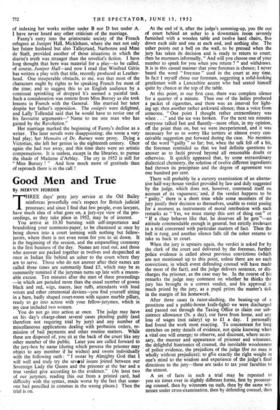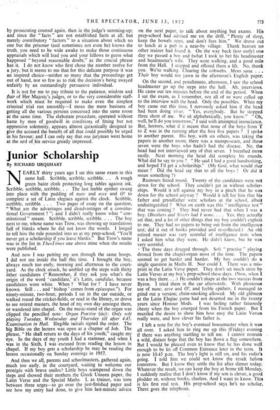Good Men and True
By MERVYNHORDER
THREE days' petty jury service at the .01d Bailey reinforces 'powerfully one's respect for British judicial processes; and since I find that few people, even lawyers, have much idea of what goes on, a jury-eye view of the pro- ceedings, as they take place in 1952, may be of interest You arrive at 10.30 bursting with self-importance and brandishing your summons-paper, to be chastened at once by being shown into a court teeming with nothing but fellow- jurors, where there is not even room for you to sit down. It is the beginning of the session, and the empanelling ceremony is the first business of the day. Names are read out, and those who answer are packed together in twelves and despatched at once in Indian file behind an usher to the court where they are to serve. Those who do not answer after their names are called three times are summarily fined E5, which may be as summarily remitted if the -juryman turns up late with a reason- able excuse. Ten minutes after the start of these proceedings —in which are paraded more than the usual number of gowns black and red, wigs, maces, lace ruffs, attendants with loud voices and other ceremonial devices—you find yourself sitting in a bare, badly shaped court-room with square marble pillars, ready to go into action with your fellow-jurymen, which in my case included two women.
You do not go into action at once. The judge may have on his day's charge-sheet several cases pleading guilty (and therefore not requiring trial by jury) and any number of miscellaneous applications dealing with probation orders, re- mission of bail payments and other routine matters. While these are disposed of, you sit at the back of the court like any other member of the public. Later you are called forward to the jury-box by name (during which process the prisoner may object to any member if he wishes) and sworn individually with the following oath : "I swear by Almighty God that I will well and truly try the sevoral issues joined between our Sovereign Lady the Queen and the prisoner at the bar and a true verdict give according to. the evidence." (At least two of our jurymen, reading this out from a printed card, had difficulty with the syntax, made worse by the fact that some- one had pencilled in commas in the wrong places.) Then the trial is on. At the end of it, after the judge's summing-up, you file out of court behind an usher to a downstairs room severely furnished with a wooden table and twelve hard chairs, five down each side and one at each end, and nothing else. The usher points out a bell on the wall, to be pressed when the jury has taken its decision and is ready to return to court; then he murmurs informally." And will you choose one of your number to speak for you when you return ? " and withdraws. It is in this casual manner that your foreman is chosen; I never heard the word " foreman " used in the court at any time. In fact I myself chose our foreman, suggesting a solid-looking gentleman with a Lancashire accent who had seated himself quite by chance at the top of the table.
At this point, in our first case, there was complete silence for a quarter of a minute. Then one of the ladies produced a packet of cigarettes, and there was an interval for light- ing up; then another rather awkward silence; then a voice from someone, "One point I thought rather extraordinary was when . . ." and the ice was broken. For the next ten minutes everyone talked fast and fluently—more often, in my opinion, off the point than on, but we were inexperienced, and it was necessary for us to worry like terriers at almost every con- ceivable suggestion put forward during the case. No mention of the word 'guilty" so far; but, when the talk fell off a bit, the foreman reminded us that we had definite questions to answer as to fac& proved beyond all reasonable doubt or otherwise. It quickly appeared that, by some extraordinary dialectical chemistry, the solution of twelve different ingredients had thrown its precipitate and the degree of agreement was one hundred per cent.
There will probably be a cursory examination of an alterna- tive half-way-house verdict provided by law and duly suggested by the judge, which does not, however, commend itself on account of its vagueness; ' and, if the verdict happens to be "guilty," there is a short time while some members of the jury justify their decision to themselves, unable to resist posing for a moment as instruments of moral retribution with such remarks as " Yes, we must stamp this sort of thing out" or "If a chap behaves like that, he deserves all he gets'"—an attitude commendable enough in general, but strictly irrelevant in a trial concerned with particular matters of fact. Then the bell is rung, and another silence falls till the usher returns to take us back to court.
When the jury is upstairs again, the verdict is asked for by the clerk of the court and delivered by the foreman, further police evidence is called about previous convictions (which are not mentioned up to this point, unless there are no such convictions, in which event defending counsel will have made the most of the fact), and the judge delivers sentence, or dis- charges the prisoner, as the case may be. In the course of his remarks the judge may comment on whether he thinks the jury has brought in a correct verdict, and his approval .is much prized by the jury, as a pupil prizes the master's tick in the margin of his homework.
After three cases (a razor-slashing, the beating-up of a prostitute and a public-house knife-fight) we were discharged and passed out through the Taxing Office to claim our sub- sistence allowance (5s. a day), our fares from home, and any loss of wages (not salary), up to 1 a day. I personally had found the work most exacting. To concentrate for long stretches on petty details of evidence, not quite knowing when a vital one will emerge; to observe, and discount, where neces- sary, the manner and appearance of prisoner and witnesses, the delightful histrionics of counsel, the inevitable woodenness of police evidence, the prejudices. of the judge (for no man is wholly without prejudices); to grve exactly the right weight in one's mind to the wisdom and experience of the judge's final directions to the jury—these are tasks to tax your faculties to the utmost.
A set of facts in such a trial may be repeated to you six times over in slightly different forms, first by prosecut- ing counsel, then shy witnesses on oath, then by the same wit- nesses under cross-examination, then by defending counsel, then by prosecuting counsel again, then in the judge's summing-up; and since the " facts " are not established facts at all, but merely contributory " factors " to a situation about which no one but the prisoner (and sometimes not even he) knows the truth, you need to be wide awake to make those continuous appraisals which will lead you and your fellows to guess what happened "beyond. reasonable doubt," as the crucial phrase has it. I do not know who first chose the number twelve for a jury, but it seems to me that for this delicate purpose it was an inspired choice—neither so many that the proceedings get out of hand, nor so few as to risk the decision's being swayed unfairly by an outstandingly persuasive individual.
It is not for me to pay tribute to the patience, wisdom and flair of Her Majesty's judges, or to the very considerable staff- work which must be required to make even the simplest criminal trial run smoothly—I mean the mere business of getting all the various persons concerned into the same room at the same time. The elaborate procedure, operated without haste by men of goodwill in conditions of fitting but not oppressive solemnity, appears almost quixotically designed to give the accused the benefit of all that could possibly be urged in his favour; and I can only say that one juryman went home at the end of his service greatly impressed.



































 Previous page
Previous page